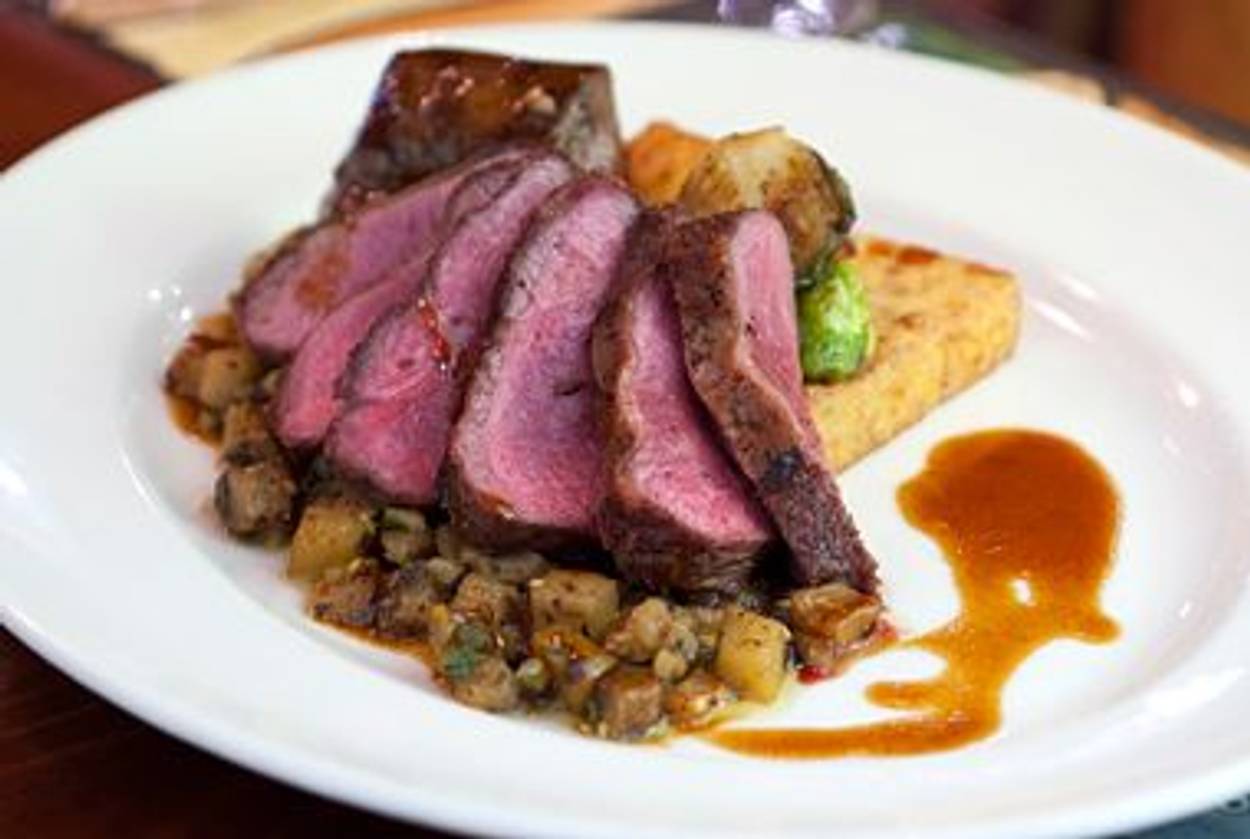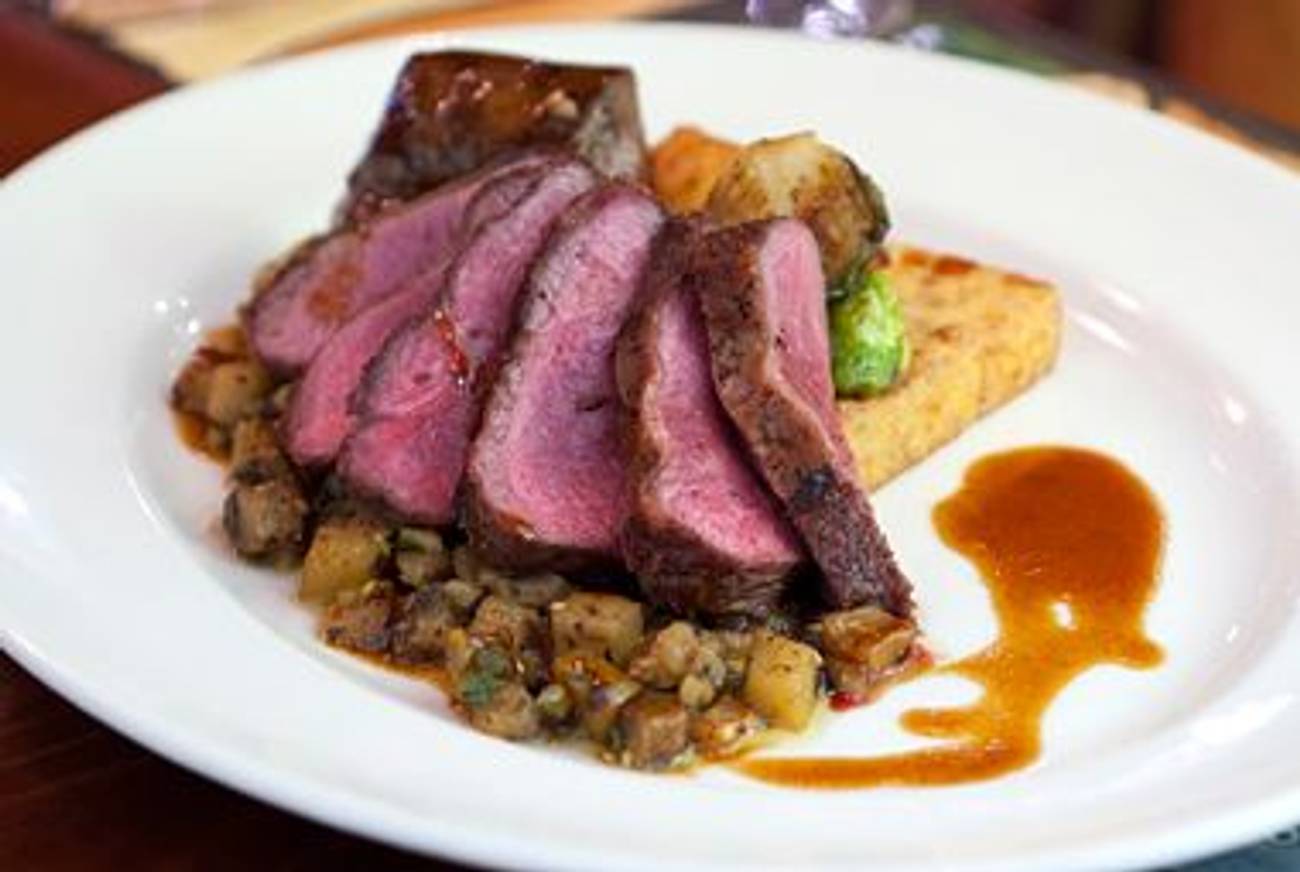On the Towns
Burekas in Florida, hummus in L.A., and elegant Israeli cuisine in Philadelphia: ferreting out the unexpected at restaurants around the country




A book tour is a marvelous way to sample the food at some very good restaurants—albeit briefly between speeches and signings—and learn about regional food innovations. During a 32-city tour I recently completed, I tasted lots of the same old, but I also stumbled on some culinary gems. I am generally reluctant to write about restaurants, especially if I have had only one meal there; I do not claim to be a restaurant reviewer. But I was excited by some of my findings. My favorite dish? A pumpkin risotto with white truffles at Binkley’s in Cave Creek, Ariz., about an hour from Scottsdale. Here’s hoping the following restaurants will whet the appetites of readers who are traveling this holiday season.
When I heard about the burekas at Avigdor’s Café in Fort Lauderdale, Fla., I was so eager to try them that I headed to this glatt kosher dairy café set back from Stirling Highway late at night, after a book talk. I have been in love with burekas, Turkish turnovers, since I lived and worked in Jerusalem in the 1970s. Every Friday morning, a municipal worker named Simontov brought them on a tray—flaky and filled with cheese or spinach or both—with Turkish coffee to the office where I was working. Although I have never found their equal, Avigdor’s, filled with spinach, cheese, and potatoes in a variety of shapes, made with prepared puff pastry, were quite good. In addition, the menu included such dishes as jahnoun, that Yemenite precurser to the kugel, served with hot sauces for Sabbath breakfast, and panko-coated fried eggplant with pesto and mozzarella. There was something very Israeli—with its good coffee and mint tea—and nostalgic about the café, which is located in a house next to a religious fellowship center that plays evangelical music.
Neal Cooper is the Jewish chef-owner of the tiny Petit Rouge on Biscayne Boulevard in Miami. Neal had contacted my publisher and invited me to dinner at his restaurant while I was in town. His menu, featuring French bistro food with touches of American cuisine, did not disappoint. It includes a tarte flambee, a thin crisp Alsatian tarte with cheese on top, trout from Grenoble, with a beurre blanc sauce and capers, and delicious tarte au citron.
In Dallas, Natalie’s Kosher Kitchen is the fleyshig equivalent of Avigdor’s, housed in one of the few kosher markets in the area. Natalie’s is run by Mordecai and Natalie Pinhas, he from Israel and she from Malaga, Spain, where members of her family have lived since before the Inquisition. Natalie’s is typical of many kosher restaurants I have seen around this country: Usually run by ex-Israelis, they either offer a small grocery within the restaurant or serve meals as part as a larger kosher market, always with bare-bones decor. In addition to good homemade hummus, Natalie’s features schwarma and Israeli and Mediterranean salads such as mambuchta, one of my favorites, with tomatoes cooked down to perfection. It also serves grilled meats and yummy eggplant dishes for vegetarians.
When I started this tour, I thought I would write about the many delis around the country, but for the most part they disappointed me. The exceptions were the smoked fish and the huge black-and-white cookies at the white-tiled 4th Street Deli in Philadelphia and the Montreal smoked meat I tasted at Brooklyn’s tiny Mile End.
In Los Angeles, I had hoped to get to Langer’s for my favorite pastrami sandwich. But in San Francisco, where people eat and breathe food, I met Leo Beckerman and Evan Bloom, two twentysomethings who are opening their own deli, Wise Sons Jewish Delicatessen, in several months. (Location yet to be determined.) Like Mile End’s Noah Bernamoff, these thoughtful boys are updating familial cuisines with bold style. I tasted their breads, a salty challah and rye bread, good enough to replace most caraway ryes and challahs in bakeries today. Stay tuned.
At the Hummus King, located in a strip mall on Burbank Boulevard in North Hollywood, Calif., the bar boasts 10 different kinds of hummus, all delicious, made from dried chickpeas from such places as Jerusalem, Jaffo, Akko, and Jordan. The varieties were similar—how dissimilar can hummus be?— but the Jerusalem was thicker and chunkier, with Jaffa and Akko thinner and smoother. Some had cilantro, some had garlic with a hint of cumin, some hot pepper, and some were simply sesame paste, salt, and chick peas. (It’s interesting that the word hummus refers to both chick peas and the dish in both Arabic and Hebrew.) The Hummus King also features a unique vegetarian schwarma made from soy. Its young owner, Jason Aballi, roamed Israel, Greece, and Jordan in search of the ultimate hummus and opened his operation, featuring the fruits of his labor, six months ago.
I have wanted to visit the modern Israeli restaurant Zahav in Philadelphia since it opened in 2008. Run by Israeli-born chef Michael Solomonov, who has been named a finalist for the James Beard award, Zahav serves elegant but homey dishes like fried cauliflower with labneh and a flatbread pizza that emerges from an authentic wood-burning taboon oven. Philadelphia, it seems, fosters Jewish chefs. Solomonov’s friend Alon Shaya, also from the City of Brotherly Love, is now the chef at John Besh’s Domenica in New Orleans, a beautiful restaurant featuring great inventive pizza, charcuterie, and pastas.
Like Philadelphia and New Orleans, Pittsburgh has lots of young people flocking to it, and it features one of the coolest fish stores I have ever seen. Located in the Strip District, the city’s historic market, the Penn Avenue Fish Company is part fish store, part restaurant. Henry Dewey, the co-proprietor, has an edgy aesthetic (his warehouselike space has a fisherman’s boat suspended from the ceiling) and spent years working at Benkovitz, the oldest fish market in Pittsburgh. Today many of the city’s Jewish residents buy the carp, whitefish, and pike they use for gefilte fish from Penn Avenue.
While on a TV show in Pittsburgh, I met Bill Fuller, the corporate chef of the Big Burrito Restaurant Group, and later stopped by Casbah, one of its restaurants, where Bill was cooking dinner. I tasted a delicious diced sautéed eggplant, slightly sweet and more than slightly sour, with the addition of citric acid usually served with roast lamb. It’s just the thing with which to ring in the new year.
Caponata
Adapted From Bill Fuller
2 large eggplants, peeled and diced into ½-inch cubes
2-4 tablespoons olive oil, as needed for sautéing
Salt and pepper to taste
2 lemons, zest and juice
1 orange, zest and juice
2 tablespoons sherry or apple cider vinegar
¼ teaspoon citric acid or sour salt to taste
1 tablespoon capers, drained, rinsed, chopped finely
2 tablespoons fresh oregano, chopped, or one tablespoon dried oregano
2 teaspoons garlic, finely minced
3 tablespoons honey or to taste
1 teaspoon cayenne pepper
1 cup celery (about 2 stalks), cut first in julienne strips and diced
1. Heat a wide skillet over high heat, and add some of the olive oil. Sauté the eggplant in batches (adding more olive oil with each batch) so that the pan is never crowded, adding salt and pepper to taste. When the eggplant is soft but not mushy (about 10 minutes) remove to a wide baking dish or bowl.
2. Stir in the lemon and orange zest and juice, the vinegar, citric acid, capers, oregano, garlic, honey, cayenne pepper, and celery. Mix well, taste, and adjust spices accordingly. Serve at room temperature as a dip or spread, or as a warm garniture for lamb. Can be made up to five days in advance.
Yield: 5 cups (serves 8-10 as an appetizer).
Joan Nathan is Tablet Magazine’s food columnist and the author of 10 cookbooks including King Solomon’s Table: a Culinary Exploration of Jewish Cooking from Around the World.
Joan Nathan is Tablet Magazine’s food columnist and the author of 10 cookbooks including King Solomon’s Table: a Culinary Exploration of Jewish Cooking from Around the World.